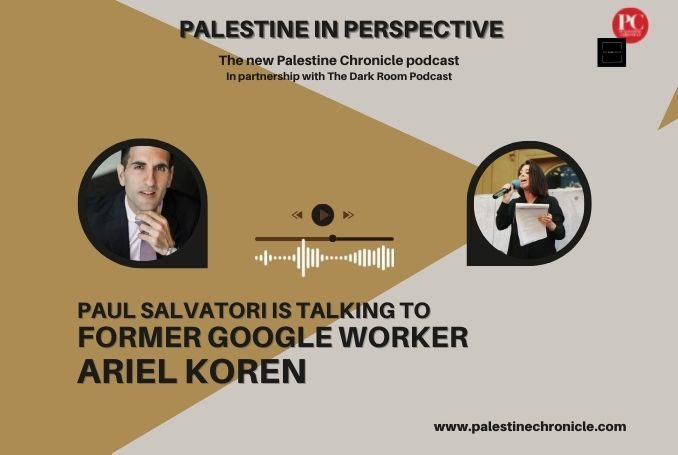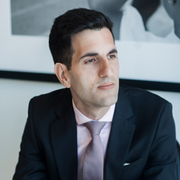
I reached out to former Google worker Ariel Koren after reading about her courageous decision to blow the whistle on the company’s Project Nimbus.
The initiative, involving other tech giants like Amazon, costs over one billion dollars and will allow the Israeli state to more closely surveillance both the activities of Palestinians and their allies, thereby potentially undermining resistance and activists’ efforts against the criminal state.
Ariel cordially accepted my invitation to be on this episode of “Palestine In Perspective”, which I used to do on my own, as a sub-series of The Dark Room Podcast.
I have now partnered with The Palestine Chronicle—after graciously being invited to do so by the editors of the publication, Romana Rubeo and Ramzy Baroud—where I will continue the series. This will thankfully allow me to reach a greater number of listeners, who in turn will have the opportunity to learn from engaging guests like Ariel about the international Palestinian struggle for justice, as well as key ideas and events that inform it.
I think you’ll find the partnership’s debut illuminating.
Ariel candidly shares with me not only additional details of Project Nimbus but the hostile work environment of Google, where the company has consistently tried to suppress and intimidate employees from showing any support for Palestine. In fact, as Ariel saw firsthand, the company weaponizes the language of “social justice”—such as diversity, equity and inclusion—to this end, while surveilling pro-Palestinian employees who rightfully take issue with Google’s (technological) support of Israeli criminality.
Speaking to her courage, this did not deter Ariel from sustaining their solidarity efforts with Palestine. Eventually, Google attempted to relocate Ariel to Brazil and also failed to investigate a malicious and antisemitic letter she received at her desk. So much for Google’s express commitment to ensuring a sense of belonging and respect for all employees.
This was understandably enough for Ariel to take and so she recently resigned from Google. If anything and from what I felt during our discussion, this has positively emboldened Ariel in her Palestinian justice efforts. This includes establishing Jewish Diaspora in Tech, directly opposed to Israeli criminality, and helping coordinate No Apartheid Tech for Apartheid, a recent set of demonstrations—throughout the United States—that take a firm stand against Google’s corporate involvement in the destruction of Palestine.
In some ways Ariel’s experience at Google reminded me of my own, specifically in larger non-profit organizations where corporate brass would employ the language of social justice to receive sizeable grants from donors, looking to support anti-oppressive initiatives, though themselves would act in an oppressive manner. This included not respecting the rights or important needs of workers and clients alike, such as those entitled to specific kinds of mental health care. The public did not see it. But those of us working for the non-profits did and routinely so, frustrated at the same time by the way the organizations would present a false exterior—characterized by principles of social justice—to the world.
Some of us took a stand against this and were either disciplined or, similar to Ariel, resigned because such protest led to upper level staff making our work lives worse (and of course with impunity).
I talk to Ariel about how this is disenchanting, as power is ultimately punishing people for doing the right thing. Especially with respect to Palestine, where so much of the West supports the Israeli state—politically or in business—I think this is something we must expect, thereby lessening or dampening the effect the disenchantment may have on us. In the end, it will not be big business but, to borrow from Ariel’s words, “people of conscience”—in solidarity with the Palestinian people—that will achieve justice for Palestine and end Israeli criminality good.

– Paul Salvatori is a Toronto-based journalist, community worker and artist. Much of his work on Palestine involves public education, such as through his recently created interview series, “Palestine in Perspective” (The Dark Room Podcast), where he speaks with writers, scholars and activists. He contributed this article to The Palestine Chronicle.








